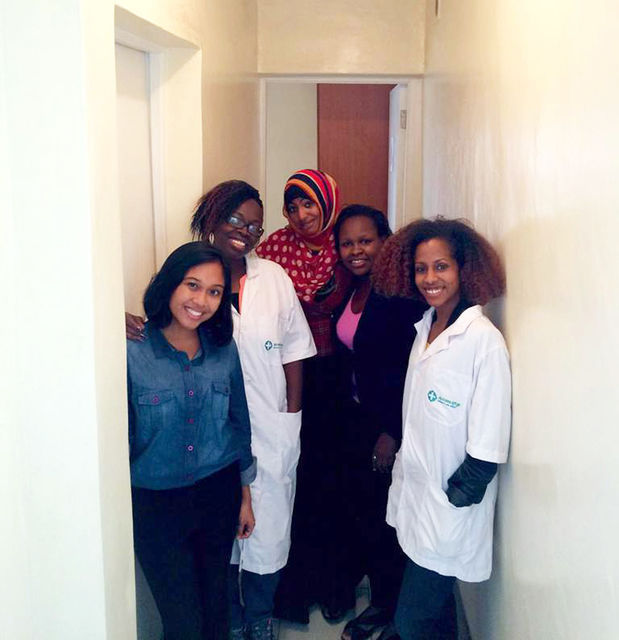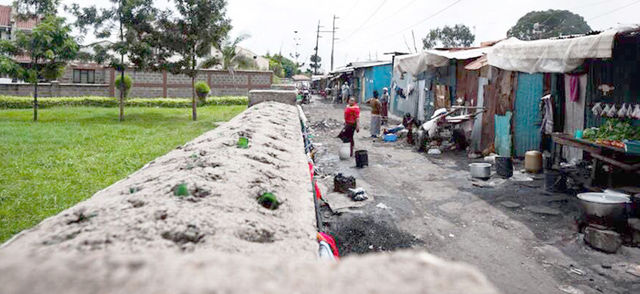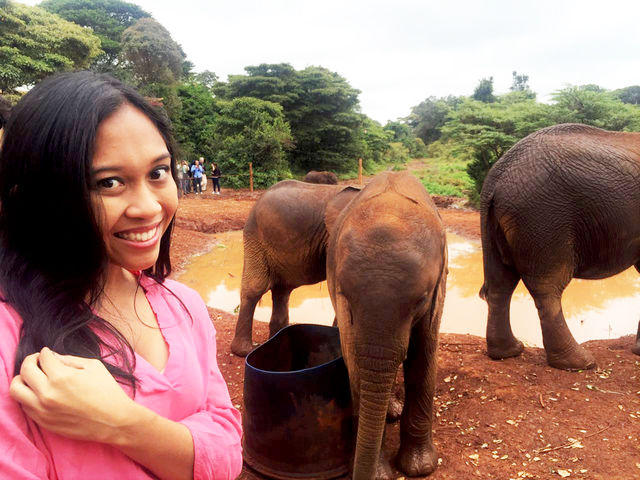Talk Story: Natasha Abadilla
Natasha Abadilla will quickly tell you that Kenya is not a place where everyone is living in mud huts, walking around half-naked and uneducated and needs help from the United States.
After two years there, she came to know the people as smart, loving and innovative. But they faced many challenges, including many who lived in the Nairobi city slums. Abadilla came to realize that the best way to help them was to integrate herself into their lifestyle, to live like a local, to come to know their land and culture and needs.
The 2010 Waimea High School graduate earned a bachelor’s degree in human biology from Stanford University and graduated in June 2014. The next month, she left for Kenya to work with a nonprofit, “Access Afya,” that tries to make life better for those struggling to get by.
The daughter of Susana and Dan Abadilla returned home, then headed to Stanford to attend medical school. She’ll take with her all she learned during her time in Africa.
•••
Why did you want to go to Kenya?
I knew I wanted to go to med school, but I wanted to gain some work experience. I didn’t want to go into med school being sort of naive and jaded and things like that. I didn’t want to burn myself out and go straight into med school. I didn’t pick Kenya, I picked the organization. I had a year-long fellowship because I had done global health trips to Guatemala, to the Philippines, while I was in college.
What’s the key to making a difference there?
I was kind of frustrated because I definitely got the feeling that everyone from America was just using the developing countries as a way to gain our own experiences and learn ourselves. There was a lot of voluntourism, is the word people use. You build a house, you teach people something, you bring like diapers and dolls and all these school supplies and then you leave. You don’t know what you did was sustainable, if the house was actually going to be built, if the hospital was going to be built, if they actually understood what you were teaching them, or like what’s going to happen when all the medicine runs out. How are they going to survive then? They become so dependent on the huge support that you brought, so what now?
Who did you end up going through?
So I wanted to go with an organization that was really sustainable and I wanted to travel. I just love traveling in general. And I found an organization through Stanford for undergraduate service and it was called Access Afya. It’s a really cool program, very grassroots, it’s in central Kenya, this small town, very rural, very Kekaha years and years ago. It was very cool because the guy who founded it and was the president. He was from that village. And through fundraisers, he went to high school and raised enough money to go to college and then law school at UCLA and he had a moment as an adult lawyer, ‘I’ve got to go back give back to my community.’
Are there other Americans where you were?
I was only one of two Americans there when I got there. It was all local staff, local nurses, local community health workers, a lot of the older generation people didn’t speak a lot of English because they weren’t in school when Kenya decided to teach English in schools.
I felt like I was really making an impact and building local capacity of the infrastructure such that when I leave, it was going to have an impact there.
What did you do there?
It was a year-long fellowship. I was actually in charge of the WASH program. WASH stands for water, sanitation and hygiene and we put clean drinking water tanks and hand washing stations in the entire sub-county, which is like the equivalent of a school district. So 181 schools and I was in charge of monitoring these tanks and teaching the kids. I taught health clubs, every school has a health club and I taught them how to properly wash their hands. It comes second nature to wash your hands and use soap before and after you eat and go to the bathroom, but a lot of kids don’t get taught that there. They’re really, really rural, so I would be on the back of a motorcycle a lot going to all these schools and doing these lessons and making sure clean drinking water tanks are clean that they have the right water guard to purify the water.
I worked a lot with the students. I also helped with the mother-child health clinics the organization also had through the schools and the churches.
What was your impression of life there?
The first year I was there, it was definitely what everybody thinks about when I say I was in Kenya. It’s very rural, people are very thankful for your help, life is very simple, a lot of them are farmers. I lived in really humble apartments where we ran out of electricity all the time.
It was a very nice experience because I was working with an organization that was really sustainable, and I could see that we were really helping the local workers who were already there before us and going to be there long after we’re gone, (and) build their capacity and make the organization a lot better.
I came to the end of my fellowship, it was a year-long contract and I could have either moved back to the United States and applied to med school from here and took on some health-consulting job or something that would be flexible enough for me to go to all my interviews and med school applications. It’s a year-long process.
So, I could come back here or I could stay in Kenya and do other work. And by the time my first year was about to end, I’d already made lot of friends in Nairobi through mutual friends, so I stayed.
What’s Nairobi like?
Nairobi is unlike anything anybody would have ever thought. The city is a more crowded San Francisco, or traffic is a little bit less controlled than San Francisco. Really posh club, really lavish shopping malls. There’s a Domino’s. In my second year I lived right next to a Cold Stone Creamery, KFC and Subway are there: all the Western comforts. I had a two-bedroom apartment with a huge balcony and a huge kitchen and I was paying $280 a month.
We always read about people going to Africa to help. Is that making a difference?
I guess that was one of the funny things about living in the city. I was doing work for underserved people but I think we as Americans, even us here in Hawaii, have this huge Western savior complex. We think, ‘Oh, you lived in Kenya, that’s amazing. You lived in grass shacks or you lived in mud huts. The same thing that people from the Mainland think about Hawaii sometimes. People are like, ‘Are there generators there? Do you all surf? Are there grass shacks?’
When I came back a month ago I was kind of disgusted when people say, ‘Oh, it must have been so hard.’ But it wasn’t. People think people are so backwards in Kenya, people think they’re still so under-educated and simple when Nairobi is one of the most innovative cities in the world. It’s the African hub of innovation and technology right now. And it was really eye-opening because there’s such a dichotomy. There’s rural Kenya, there are the slums. But people in Nairobi are doing really well.
Do you always get upset when people think they can save the day with a trip to Africa?
We think we’re do much better than developing countries and it kind of pisses me off. I made lots of Kenya friends. I can understand and speak Swahili. It’s so much of the white savior complex here.
It’s just a thing I wish everybody knew. In Kenya, not everybody lives in mud huts and walks around half-naked and doesn’t know how to read. I still get really worked up about it.
Can you share a story of something that really impacted you?
How underserved some of the communities are in the slums that I worked in. We were talking to some of the moms at a little medical camp we were running, and they said something like, ‘Oh yeah, my baby just died last week at the government hospital because nobody came to help us. They died in the waiting room.’
She said that like, the sky is blue, the grass is green, my baby died. You know what I mean? It’s really hard hitting, because here we were in the slums giving really good medical care because someone had this great idea to provide quality medical care in the city slums, and then people who knew their babies were doing worse would take their babies to government hospitals and sometimes government hospitals weren’t the best medical provider and the triage system just doesn’t work as well there. So if you’re not crying or bleeding out you’re not going to get seen first.
There’s a lot of learning to do. People are doing good things with mother and children health. The first lady of Kenya has this big mom and baby program.
I think what is really needed is sustainable health instead of nonprofits coming in and building clinics and white doctors coming in and building these great technological incubators and things like that and then leaving. I think it’s sustainable education.
How did you get to know people?
I lived like a local.
I think being around all of that and listening to that mom when I was in the slums made me realize I hope maybe in the future I would be able to do something more sustainable and be more locally led instead of the outsider bringing in all these diapers and school supplies and things like that.
After two years in Kenya, what difference will this have on your life?
I think I’m just so much more open minded. I was one of the people who thought people in Africa be must living in mud huts the entire time. I’m more opened-minded to the developing world and we have to stop this savior stuff out and just immerse yourself in their world.
I would rather want to understand the people I’m living with or caring for than swoop in with all my smarts and good ideas and be the superwoman that saves the day. It’s hindered Kenya a lot, these organization that say, ‘Let’s take all these students and have them have great experiences for a month or so. I think they’re making their country hurt even more so.
Any concerns for you safety there?
The same concerns you would have if you were in another big city. You just have to keep a good head on your shoulders and just stay within your bounds, I think you’re fine.
What did you do on your free days?
I ran a lot. The Karuru Forest in Nairobi is like Central Park in New York only so much more bigger and so much more beautiful.
I just hung out with friends, at mall, shopping centers, clubs. There was a lot do to.
Looking back, was it worth the two years?
Oh yeah, so worth it. I think anybody should spend a little time traveling. It just really opens your eyes. Try to do the local stuff and immerse yourself in the culture.
No problems with racism for you?
None. They called me a white girl there. People thought I was white.




